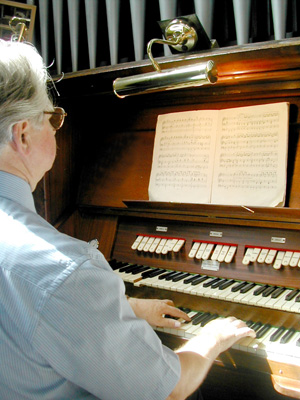 Most of us Catholic musicians are familiar with the copyright policies of the major Catholic music publishers. We are told in copyright warnings, in annual reprint licenses, by the support staff of these publishers that we are absolutely not allowed, ever, to make a photocopy of a hymn from a published hymnal (without paying a licensing fee). The reason for this, it is said, is to protect the publisher’s financial investment in the musical engraving of the hymn. It doesn’t matter if this hymn, text, and harmonization have been in the public domain for 200 years. Even if only the engraving is all that the publisher can legitimately claim copyright on, this is enough to assess reprint licensing fees which often begin with a $20 base fee.
Most of us Catholic musicians are familiar with the copyright policies of the major Catholic music publishers. We are told in copyright warnings, in annual reprint licenses, by the support staff of these publishers that we are absolutely not allowed, ever, to make a photocopy of a hymn from a published hymnal (without paying a licensing fee). The reason for this, it is said, is to protect the publisher’s financial investment in the musical engraving of the hymn. It doesn’t matter if this hymn, text, and harmonization have been in the public domain for 200 years. Even if only the engraving is all that the publisher can legitimately claim copyright on, this is enough to assess reprint licensing fees which often begin with a $20 base fee.
Well, it seems that the weighty “financial investment” that warrants these reprint licensing fees is somehow able to be avoided by individuals, such as a single retired protestant minister and organist who has put together SmallChurchMusic.com.
This website is not flashy, it is not perhaps meeting Web 2.0 standards of design, but it does currently contains 3260 public domain mp3 hymn recordings, 2270 free pdf hymn scores, 3110 hymn texts, and 610 downloadable midi files–all of a remarkably high quality. And did I mention that these are available for free download? That reprint licenses are not required?
So how is that a retired protestant minister can share freely with the world the best music of his tradition as a result of a personal project that amounts to not much more than a hobby, when for-profit corporations cannot afford to lose the return on their financial investment in the typesetting of a public domain hymn for one of their hymnals? Perhaps the reason is slowly becoming clearer.
I wonder how the world of Catholic liturgical music could be affected if a bunch of similarly devoted individuals pooled their time, energy and resources to produce something of a similar nature for Catholic liturgy?

The reason for this, it is said, is to protect the publisher's financial investment in the musical engraving of the hymn. It doesn't matter if this hymn, text, and harmonization have been in the public domain for 200 years. Even if only the engraving is all that the publisher can legitimately claim copyright on…"
Surely this was a legitimate concern in days gone by but hardly relevant given the technology available today.
To be fair, there is a charge for mp3s of copyright music, and I don't see copyright print music at all.
Yes, you're right. Fair enough. He obviously must charge for distributing copyright music. Surely not for his personal profit, but to pay the copyright holders. The majority of his scores and recordings seem to be in the public domain.